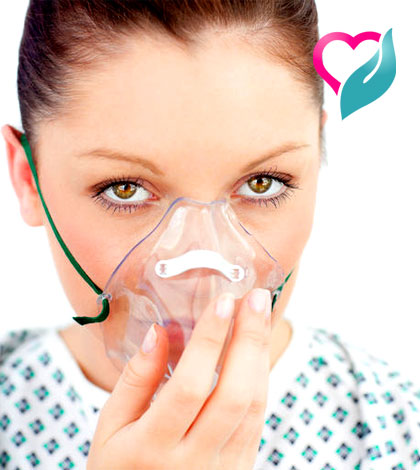Hypoxemia, or low blood oxygen, describes a lower than normal level of oxygen in your blood. In order to function properly, your body needs a certain level of oxygen circulating in the blood to cells and tissues. When this level of oxygen falls below a certain amount, hypoxemia occurs and you may experience shortness of breath.
[wp_ad_camp_1]
There are many causes for hypoxemia, ranging from damage to the lungs caused by conditions such as COPD to breathing too little while you sleep. Hypoxemia can also be caused by environmental factors such as low oxygen levels in the surrounding air (at high altitudes, for example) or through low-oxygen activities such as underwater diving.
Your doctor determines whether you have hypoxemia by measuring your blood oxygen level — the amount of oxygen traveling in your arteries. Your blood oxygen can be measured by testing a sample of blood from an artery.
An approximate blood oxygen level can also be estimated using a pulse oximeter — a small device that clips on your finger. Though the pulse oximeter actually measures the saturation of oxygen in your blood, the results are often used as an estimate of blood oxygen levels. Normal pulse oximeter readings range from 95 to 100 percent, under most circumstances. Values under 90 percent are considered low.
[wp_ad_camp_4]
Causes
Common causes of hypoxemia include:
- A blocked airway
- Anemia
- ARDS (acute respiratory distress syndrome)
- Certain medications, such as narcotics and anesthetics, which depress breathing
- Congenital heart disease — heart defects that are present at birth
- COPD (chronic obstructive pulmonary disease)
- Emphysema
- High altitudes
- Interstitial lung disease
- Pneumonia
- Pneumothorax
- Pulmonary edema
- Pulmonary embolism
- Pulmonary fibrosis
- Sleep apnea
[wp_ad_camp_2]
Symptoms
Hypoxemia isn’t a condition that should be ignored, as the consequences of leaving the condition untreated can be serious. Here are a few of the tell tale signs of hypoxemia. If you are suffering from any of these issues on a regular basis, consult your doctor.
Confusion, Memory Loss, & Lack of Concentration
If you frequently find yourself struggling to concentrate, forgetting things even though they happened quite recently or confused then you could be suffering from low oxygen levels. This is because the level of oxygen reaching your brain has decreased, affecting cognitive function.
Fatigue
Fatigue is difficult to attribute solely to hypoxemia because the reasons for suffering from it could be as simple as not getting enough sleep but should be considered as a warning sign. Fatigue affects different people in different ways and the onset of the symptom can take hold at a different pace.
Shortness of Breath
Shortness of breath is one of the most obvious symptoms of low blood oxygen. This symptom is more obvious at times of physical exertion, when a struggle to breathe could be explained by a general lack of fitness. Combined with the other symptoms of hypoxemia, however, any struggle to breathe should be taken seriously.
Headaches
Headaches alone should not be considered a symptom of hypoxemia but are frequently associated with the condition. If you are suffering regular headaches in conjunction with the other symptoms listed in this post, get in touch with your doctor.
Other Symptoms
- Frequent bacterial and viral infections
- Chest tightness
- Tingling fingers
- Chronic cough
- Blue coloring around lips
- Waking at night gasping
Complications
Your body requires 92% blood oxygen saturation or above. There is no getting around your oxygen requirement.
If you ignore your low oxygen level –
- You will lose your eye sight
- Your short term memory will be lost
- Your strength and stamina will be drained
- Your immune system will struggle
- Heart failure is an inevitable consequence
Self-Care
EHC strongly urge its readers to see professional medical assistance if you have symptoms of hypoxemia. Coupled with your doctor’s services, you may try the following self-care measures too.
To cope with chronic shortness of breath try to:
- Stop smoking. If you’ve been diagnosed with COPD or other lung disease, the single most important thing you can do is to quit smoking.
- Avoid passive smoke. Avoid places where others smoke. Secondhand smoke can cause further lung damage.
- Get regular exercise. It may seem difficult to exercise when you have trouble breathing, but regular exercise can improve your overall strength and endurance.
Treatment
As hypoxemia is not an easily diagnosable condition based on symptoms alone, it is a good idea to use a pulse oximeter to monitor your oxygen saturation levels if you are worried. These devices give you a clear reading of your blood oxygen levels, although it is important to also consult your doctor if you are suffering from the symptoms above.
Beyond that, treatment for low oxygen levels can vary depending on the severity of your condition. Mild cases of low blood oxygen can be remedied through lifestyle changes such as getting more exercise, eating foods rich in antioxidants and undertaking breathing exercises.
More serious cases of hypoxemia, however, could require oxygen therapy. In these instances, a doctor will prescribe an oxygen concentrator for home use, with the level of usage dependant on the severity of a patient’s condition. Low blood oxygen levels are surprisingly prevalent in modern society, so it is important to regularly monitor your wellbeing and visit your doctor if you are concerned about your blood oxygen level.
[wp_ad_camp_1]
Image courtesy: cloudfront.net ,





















